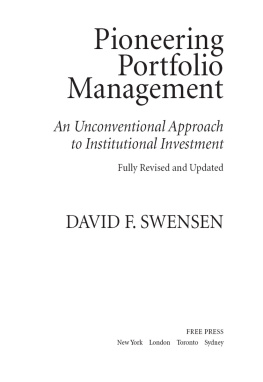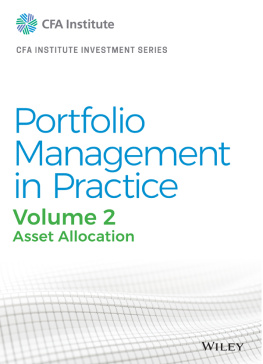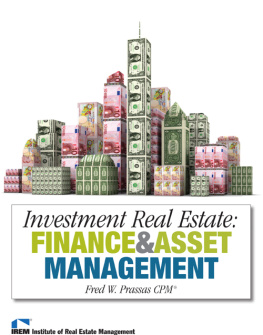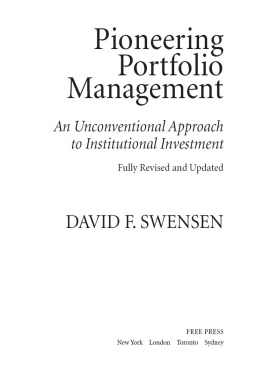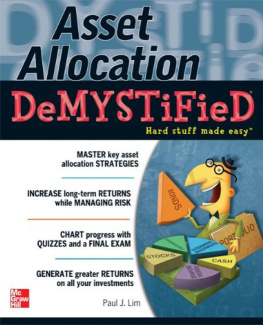Also by David Swensen:
Unconventional Success:
A Fundamental Approach to Personal Investment

FREE PRESS
A Division of Simon & Schuster, Inc.
1230 Avenue of the Americas
New York, NY 10020
Copyright 2000, 2009 by David F. Swensen
All rights reserved, including the right to reproduce this book or portions thereof in any form whatsoever. For information address Free Press Subsidiary Rights Department, 1230 Avenue of the Americas, New York, NY 10020
FREE PRESS and colophon are trademarks of Simon & Schuster, Inc.
Library of Congress Cataloging-in-Publication
Data Control Number: 2008021556
ISBN-13: 978-1-4165-5403-5
ISBN-10: 1-4165-5403-3
Visit us on the World Wide Web:
http://www.SimonSays.com
To Tory, who excels as a student and shines as a writer, while approaching life with compassion and sensitivity that enrich all those who know her.
To Alex, who programs computers (without being a geek) and modifies cars (without being a gearhead), while inspiring all who know him with his courage.
To Tim, who avidly plays sports of any ilk and just as avidly roots for Yales bulldogs, while thrilling teammates and spectators with his infectious enthusiasm.
To my parents, who invariably showed me the right path, even though I sometimes failed to take it.
Contents
Foreword
by Charles D. Ellis
C orrectly and increasingly widely recognized as the best book ever written on managing institutional investment portfolios, Pioneering Portfolio Management presents in plain language the knowledge and understanding David Swensen has developed over thirty years of intensive research and extensive experiencemost particularly during the most recent twenty-three years, over which he and his team at Yale have produced simply astounding serial successes as innovative professional practitioners. Swensen has proven himself one of the worlds truly great investment professionals.
Some of the obvious consequencesplease fasten your seatbeltsare inspiring:
- Yale has enjoyed the happy benefits of Swensens remarkably good investment results. Funds flowing to the University have increased over the past twenty years by nearly $3 million every day.
- Endowment support for Yale Universitys expanding budget has increased from 10 percent of expenditures in 1985 to 45 percent of a much larger total in 2009.
- Swensen has produced in current purchasing power for his favorite universityas defined by the incremental superior performance over and above the average results achieved by
- During the past twenty-three years, the value added by David Swensen, Dean Takahashi, and their colleaguesover and above their endowment peershas been an astonishing $16.5 billion.
- With President Richard C. Levins wise and creative leadership, Yale has used this financial strength to position itself as a leader among the worlds great universities for the benefit of all people. Alumni and friends of Yale, encouraged by Swensens investment results and Levins leadership, have proven themselves remarkably generous in their gifts for their university and its future.
On seven major dimensions, Yales investment management stands out:
- Returns over long periods are outstanding.
- The consistency of these returns is remarkable.
- The structural strength of the portfolio against market adversities is robust. Charming as achievements on offense have been, the first priority has always been on active defensedefense in portfolio structure, defense on manager selection, and defense in manager relationships.
- The innovative and assertive search for superior opportunitiesby asset class and by manageris exemplary.
- The linkage of endowment investment management to Yales overall financial management continues to be innovative, constructive, and prudent.
- The organizational effectiveness and teamwork efficiency shown consistently by the Yale Investments Office is admirable.
- The series of very favorable working relationships between Yales Investments Office and its quite numerous external managers bring many important advantages to Yales endowmentincluding identifying possible new managers.
Happily, these advantages have a compounding benefit for the endowment and, therefore, for Yale University and its capacity for public service.
Original and innovative as he continues to be, Swensen incorporates in his book the cream of others best thinking. John Maynard Keynes criticized fiduciaries for preferring to fail conventionally rather than taking, as Swensen so often does, direct responsibility for independent, even pioneering thought and action. When Bob Barker of the Advisory Committee on Endowment Management reported to the Ford Foundation how important it was in theory for the nations endowments to take the truly long-term view that would lead them to an appropriate emphasis on equity investing, he would have celebrated Swensens extraordinary successes in practice. Sometimes explicitly and often implicitly, Tobin, Markowitz, Samuelson, Sharpe, Buffett, Black, Scholes, Ross, Liebowitz, Litterman, and other great thinkers are all here.
Nothing is so powerful as a theory that works, and Swensen has integrated the abstract conceptual work of the Academy with the pragmatic rough and tumble of the Street to make theory work and , as a gifted teacher, share his best understandings in this remarkable booka gift to those who share his devotion to rigorous thinking that penetrates complexity while rejecting the temptations of oversimplification.
As innovative and successful as Yales many investment initiatives have beenand Yales extraordinary achievement in superior long-term results quite naturally attracts all the attentionclose observers know that the real secret in Yales investment success is not the profoundly pleasing performance produced over the past five, ten, and twenty years. Just as the secret of real estate is location, location, location, the real secret to Yales remarkable continuing success is defense, defense, defense.
But how, you might ask, can defense be so important to Yales remarkably positive results? Starting with those great truisms of long-term success in investingIf you lose 50 percent, it will take a 100 percent win just to get even, or If investors could just delete their few large losses, the good results would take care of themselvesall experienced investors will gladly remind us of the great advantages of staying out of trouble. Delete a few disasters and compounding takes care of everything. (The equivalent in driving is simple: No serious accidents.)
Consistency of strong results over many yearsplus indications that even as competition gets stronger, Yales results are still improving comparativelyprovides evidence of the advantages of Swensens giving first priority to a strong and assertive defense. On a strong defense first foundation, he and his team conduct a repetitively active search for better ways to manage the total portfoliofrom individual manager selection and manager creation to pioneering concepts of asset classes. Yale continues to demonstrate that the best defense in free and dynamic markets is neither fixed nor cautious, but rather, is resourceful, bold, and active on every level.
The architecture of Yales portfolio structure is designed to enable the endowment to weather with confidence the storms and disruptions that are sure to comebut at unknowable timesto the worlds capital markets and to position the endowment portfolio on the efficient frontier in trade-offs between risk and return. Using Monte Carlo simulations that incorporate many years of past market experience, Yales portfolio is carefully structured to achieve optimal, non-covariant resultswith particular attention to understanding and thereby avoiding unrewarded market adversities.

